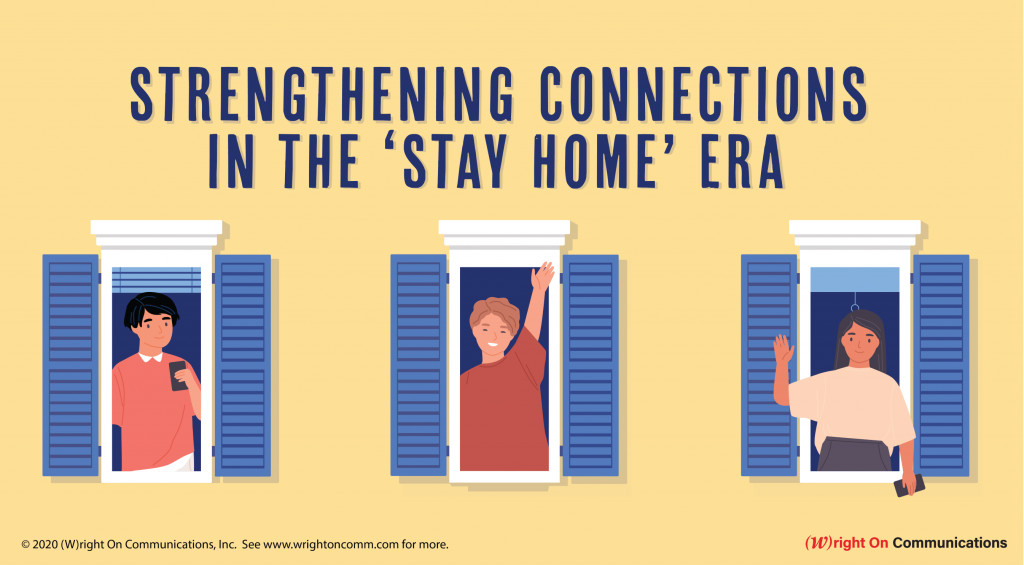By Licia Walsworth — Communications Strategist
How businesses can adapt via the virtual world
Individuals and businesses alike are experiencing a profound shift in reality, with life feeling more and more like the plot of a novel or movie. Organizations have seen their entire workforces confined to their homes. Schools and universities stand vacant. Small business owners have no customers coming through their doors. Friends, colleagues, teammates, and extended family members suddenly find themselves isolated from one another.
But a remarkable thing happens when people are faced with a challenge: They become innovators, problem solvers, and out-of-the-box thinkers.
Physical Distancing – Not Social Distancing
Technology makes it possible to keep the economy moving. It enables us to remain connected in ways that would not have been conceivable just a decade ago. In a world where coworkers had typically been spending more time with one another on a weekly basis than with their own families, the virtual world is now providing people with a unique opportunity for valuable human interaction — on a personal level, as well as on a professional level. Companies are adapting to virtual team meetings and telecommuting on a grand scale. If carried out correctly, these shifts can result in a greater sense of engagement and self-worth on the part of employees.
Connecting online actually does more than keeping us connected. It is strengthening connections by creating more personal or intimate interactions than coworkers could ever have had before. On a video conference call, for instance, coworkers might glimpse one another’s kids, pets, and home-based work spaces. This levels the playing field in a new way; it makes everyone human and more than just a title or job description. This increases the emotional investment coworkers, managers and direct reports have in each other. The old adage stands true: You work harder for those you care about and those who you know care about you.
That quick knock on the door to ask a question or to chat briefly has been replaced by such platforms as Microsoft Teams or Slack. The ability to quickly bounce ideas back and forth without multiple emails or an extended meeting makes for more efficient communication and a valuable savings on time.
Business-to-client interactions have seen a dramatic change, too. Marketing messages are more mindful, taking on a human element over sales-driven campaigns, as businesses of all kinds recognize that everyone is living in a new state of reality. Communicating to your target audience may mean pulling back from your business-as-usual marketing, but it does not mean sacrificing your brand. As client and customer priorities change amid crisis, companies must take the time to coach them through this next phase — whether that means making sure a client’s business keeps running or reassuring a customer that you will be there for them through the thick and thin. Interactions in this new reality matter; relationships strengthened in a time of need will continue to prosper moving forward.
From Karate to Cake-Making
Communicating in new ways is forcing innovation everywhere. Karate instructors are using Zoom to hold virtual classes. Schoolteachers and principals are using Twitter to stream book read-alouds or to recite the Pledge of Allegiance first thing in the morning. Grandparents are sharing cake-baking lessons with their grandchildren via Google Duo. Maintaining that level of interaction with students, loved ones, and your community during this time is crucial.
Business owners at all levels can find similar ways of engaging their customer base, strengthening connections in the virtual world, in order to continue moving their work forward and ensure they remain financially stable. That does not mean that you need to push your products or take advantage of your customers during a difficult time; it means staying true to your brand and what you can do for your audience. Consider distance learning education companies that are sharing strategies and tools for free not only with teachers, but also with parents who now find themselves homeschooling. Airlines and hotels that are waiving change and cancellation fees for travelers. Keep your loyal customers and be an example of goodwill during a time of crisis.
This is the time for strengthening connections to push a heightened sense of community and trust, to serve as a resource to your clients, and be an example in the virtual age to your team.














